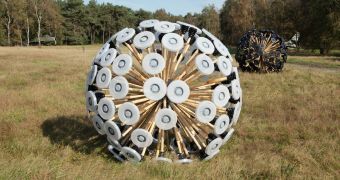Awesome inventions relying on renewable power are launched, completed and applied on a daily basis all across the Globe, but only some of them manage to turn heads and make it as proud finalists in prestigious competition.
The Design Museum in London will soon organize the annual Designs Of the Year 2012 contest, seeking to find and reward the most appealing concepts unveiled, in terms of design. One of the ones definitely worth mentioning is the odd-looking, life-saving Mine Kafon, introduced by Massoud Hassani. The eco-friendly gadget, first unveiled during the Milan Furniture Fair, has managed to make several people raise an eyebrow. It's a device equipped with a GPS that succeeds in tracking and deactivating mines.
Even though its amazing functionality could be linked to the usage of fossil fuels, this is definitely not the case, since the Mine Kafon only gets a clean green boost from wind power.
It simply rolls on surfaces of land and gets the job done. It was fully tested by its developer, due a collaboration with the Dutch Defense. Since they recorded good result, the plan is to improve the concept and then implement it on a large scale, to serve in several military applications.
“We are nominated for the Designs Of the Year 2012 by the Design Museum in London. It's really a great honor to be a part of this selection. It gives us more hope and trust to keep hard working on this project.We tested the antiland-mine ball with several explosions. It worked out pretty well. In the future are more tests planned to bring this project to the next level,” reveal the developers.
Apart from the fact that it is powered only by wind, the gadget displaying an awesome design is made using eco-friendly, cheap materials, mostly bamboo. Therefore, its carbon footprint is minimal.
Moreover, since it does not involve conventional energy or expensive fabrics, its production costs are currently evaluated at only $40 (€31).
Encouraged by his success, Massoud Hassani plans to bring his new toy to Afghanistan, where it could become a powerful asset in the long term.

 14 DAY TRIAL //
14 DAY TRIAL //